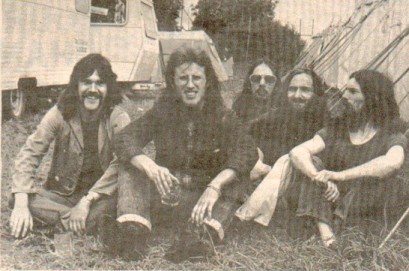
“We’re becoming less of a folk band, the rock side’s coming up all the time now,” said Lindisfarne’s bass player Rod Clements last week, after the group’s Royal Festival Hall gig with poets Pablo Neruda, Stephen Spender, Brian Patten and Adrian Mitchell.
“Alan Hull used to be a folk singer but more for practical reasons than anything else, and we’ve always been interested in rock basically,” added Rod. “We’ve only been dabbling in folk.”
This may sound strange after the heavy folk flavour of both Lindisfarne’s albums and their two single hits Meet Me On The Corner and Lady Eleanor. Fog On The Tyne has now been in the album charts for over twenty consecutive weeks and Nicely Out Of Tune from which Lady Eleanor is taken, is climbing up second time around.
Since the folk sound of Lindisfarne has been so successful why should they change it? Part of the answer is that we’ve been getting a bit of a false picture of Lindisfarne from the albums.
“We’ve been in a bit of a dichotomy,” said Rod. “We’ve been folkier on the albums and much rockier on stage. Anyway, rock is where it’s at. It’s exciting for the audience to watch and for the musicians to play. “The reason that we got into folk is that the songs are uppermost and we are a writing band. We’ve always been looking round for a form to express our songs best without instrumental indulgences and we’re still going to play songs as songs, it’s just that they’ll be rock songs rather than folk.
“Actually it’s not a question of writing different sorts of songs, it’s really the way we play them. We would have done all right as a folk band because of our songs, but it’s a question of doing what we want to do. For me being a bass player automatically means that I’m used to rhythms sections, amplifiers, funkiness and all the rest.”
So however Lindisfarne play from now on, it’s still the songwriting that moves them along. Said Rod, “There are a lot of groups around who are good rock and rollers but their songs are nothing. But there is one good rock and roll group that turn out good songs that should be mentioned and that’s the Stones. I think Sticky Fingers was excellent music, from a rock and roll and lyrical point of view.
“The kind of thing that Dylan started with words hasn’t been followed up really,” continued Rod. I’ve just been listening to Highway 61 a lot again and it’s shit hot musically and the words are miles in advance of anyone else. “Lady Eleanor wasn’t a heavy song in the Highway 61 or Sticky Fingers sense but I think it tells a story in an intelligent sort of way that people can get something out of.”
Despite the group’s two hit singles and appearances on the dreaded Top Of The Pops – “a fairly painless experience” says Rod – Lindisfarne have no plans at present to release another single. “There’s a real danger in worrying about follow up singles,” said Rod, “and I couldn’t see us falling into that trap. We write songs and they go on our albums and certain tracks are released as singles if we think they are marketable. I’m sure there will be more single but we’ve nothing in mind right now.”
However the group are soon to go into the studio again to work on their third album. They are presently enjoying a couple of weeks off after playing dates in Germany and Switzerland. Then they start rehearsing for the album.
Lindisfarne are not a group who go into the studio with only a vague idea of what they might record. They thoroughly work their songs out beforehand and then go and put them on tape, most of the material being written by Rod Clements and Alan Hull. “We write a set of words to a certain tune over a certain chord sequence,” Rod explained. “After that, everyone invents their own bit, we play it over a few times and then an arrangement goes over that.
“We’ve four or five songs written for the album so far. The third album though seems to be the one that traditionally gets knocked after the first two have been praised. Just think of the Beatles, the Stones and the Band – all their third albums got a slagging. However we’re really optimistic the way ours is shaping up.”
Like Fog On The Tyne the new album will be produced by Bob Johnston. “It was a bit strange working with Bob at first,” recalled Rod. “We were very much in awe of him as the man who produced Dylan. To everything he suggested – down to going out for a pint – it was ‘Oh yes, Bob’. We got a bit sidetracked, but towards the end we got a much better understanding going and he’s a technically brilliant producer.”
As Lindisfarne go on to their third album about the only regret the group admit to is that the character of their live performances has changed. Gone are the days of knocking around pubs and clubs in the northeast. Said Rod, “We’re playing in big halls now. You can’t get the atmosphere of some of the little clubs. We’ve spent last year gigging nearly every night. We must have played in literally three hundred clubs. It got a drag at the time but every now and then you got a really good club where the people were friendly and it went really great, and we’d all have a really good night out. It’s a shame we’re not able to do that at the moment.